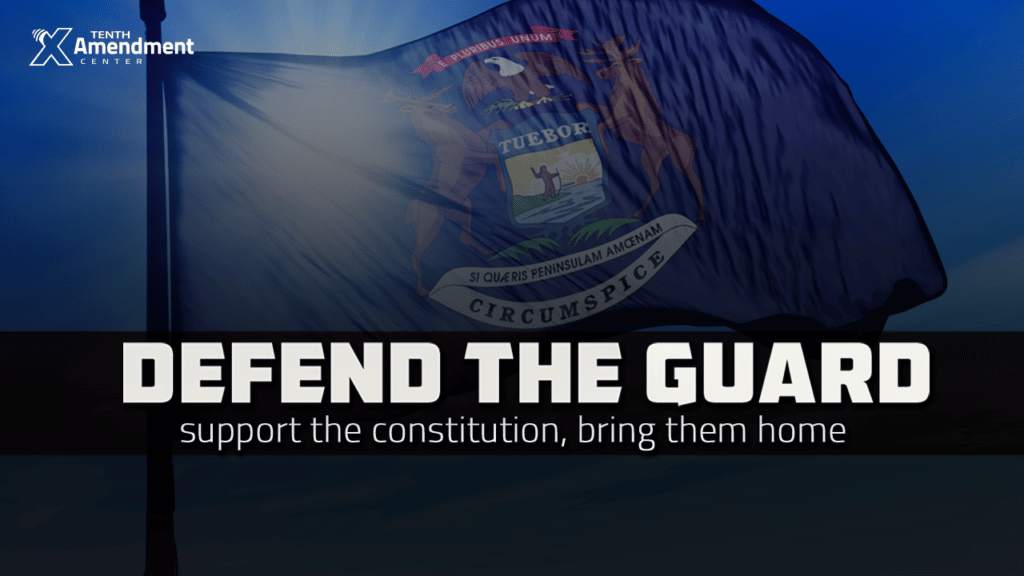LANSING, Mich. (Jan. 11, 2019) – A bill introduced in the Michigan House would prohibit unconstitutional foreign combat deployments of the state’s national guard troops, an important step towards restoring the Founders’ framework for state-federal balance on the Guard.
Rep. Steven Johnson (R-Wayland), along with a bipartisan coalition of two Republicans and two Democrats, introduced House Bill 5320 (HB5320) on Jan. 9. Johnson joined the U.S. Air Force in 2009. He served for four years, leading a team working on nuclear missile electronics in Montana. He was recently named “most conservative house member” in Michigan by MIRS News.
The legislation would prohibit the deployment of Michigan Guard troops in “active duty combat” unless there is a declaration of war from Congress, as required by the Constitution. It reads, in part:
the Michigan National Guard and any member of the Michigan National Guard shall not be released from this state into active duty combat unless the United States Congress has passed an official declaration of war or has taken an official action under clause 15 of section 8 of article I of the Constitution of the United States
Cosponsors include Reps. David LaGrand (D-Grand Rapids), Brad Paquette (R-Berrien Springs), John Reilly (R-Oakland) and Jewell Jones (D-Inkster).
IN PRACTICE
Guard troops have played significant roles in all modern overseas conflicts, with over 650,000 deployed since 2001. Military.com reports that “Guard and Reserve units made up about 45 percent of the total force sent to Iraq and Afghanistan, and received about 18.4 percent of the casualties.” More specifically, West Virginia National Guard troops have participated in missions in Iraq, Afghanistan, Libya, Kosovo and elsewhere.
Since none of these missions have been accompanied by a Constitutional declaration of war, the Defend the Guard Act would have prohibited those deployments. Such declarations have only happened five times in U.S. history, with the last being at the onset of World War II.
BACKGROUND
Article I, Section 8, Clauses 15 and 16 make up the “militia clauses” of the Constitution. Clause 16 authorizes Congress to “provide for organizing, arming, and disciplining, the Militia.” In the Dick Act of 1903, Congress organized the militia into today’s National Guard, limiting the part of the militia that could be called into federal service rather than the “entire body of people,” which makes up the totality of the “militia.” Thus, today’s National Guard is governed by the “militia clauses” of the Constitution, and this view is confirmed by the National Guard itself.
Clause 15 delegates to the Congress the power to provide for “calling forth the militia” in three situations only: 1) to execute the laws of the union, 2) to suppress insurrections, and 3) to repel invasions.
During state ratifying conventions, proponents of the Constitution, including James Madison and Edmund Randolph, repeatedly assured the people that this power to call forth the militia into federal service would be limited to those very specific situations, and not for general purposes, like helping victims of a disease outbreak or engaging in “kinetic military actions.”
RETURNING TO THE CONSTITUTION
It is this limited Constitutional structure that advocates of the Defend the Guard Act seek to restore. That is, use of the Guard for the three expressly-delegated purposes in the Constitution, and at other times to remain where the Guard belongs, at home, supporting and protecting their home state.
While getting this bill passed isn’t going to be easy, it certainly is, as Daniel Webster once noted, one of the reasons state governments even exist.” In 1814 speech on the floor of Congress, Webster urged similar actions to the Michigan Defend the Guard Act. He said:
“The operation of measures thus unconstitutional and illegal ought to be prevented by a resort to other measures which are both constitutional and legal. It will be the solemn duty of the State governments to protect their own authority over their own militia, and to interpose between their citizens and arbitrary power. These are among the objects for which the State governments exist.”
WHAT’S NEXT
HB5320 has been assigned to the House Committee On Government Operations. It will need to pass by a majority vote in each before moving forward in the legislative process.
Michigan residents who support the bill are strongly urged to contact each member of the Committee and firmly, but respectfully urge them to vote YES on HB5320 when it comes up for a hearing and vote. Contact info for committee members can be found at this link.




























